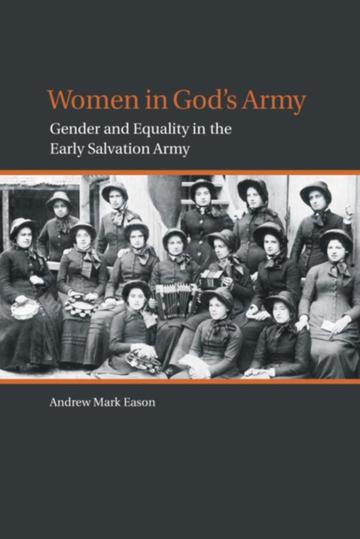The early Salvation Army professed its commitment to sexual equality in ministry and leadership. In fact, its founding constitution proclaimed women had the right to preach and hold any office in the organization. But did they?
Women in God’s Army is the first study of its kind devoted to the critical analysis of this central claim. It traces the extent to which this egalitarian ideal was realized in the private and public lives of first- and second-generation female Salvationists in Britain and argues that the Salvation Army was found wanting in its overall commitment to women’s equality with men. Bold pronouncements were not matched by actual practice in the home or in public ministry.
Andrew Mark Eason traces the nature of these discrepancies, as well as the Victorian and evangelical factors that lay behind them. He demonstrates how Salvationists often assigned roles and responsibilities on the basis of gender rather than equality, and the ways in which these discriminatory practices were supported by a male-defined theology and authority. He views this story from a number of angles, including historical, gender and feminist theology, ensuring it will be of interest to a wide spectrum of readers. Salvationists themselves will appreciate the light it sheds on recent debates. Ultimately, however, anyone who wants to learn more about the human struggle for equality will find this book enlightening.
Andrew M. Eason is an associate professor of religion at Booth University College in Winnipeg, Manitoba.
I found the book fascinating and its message disillusioning. For people interested in the history of gender in Britain and in women's ministry, this examination of a narrow slice of time, which was so fundamental in shaping the world we live in today, is well worth a look.
A useful addition to undergraduate courses on women and religion as well as a welcome contribution to the study of nineteenth-century religious movements, in general, and the Salvation Army in particular.
[This book] offers a fascinating and carefully nuanced study of the place of women in the early Salvation Army...This text will make a fine addition to academic libraries serving those who want to apply recent feminist scholarship to denominational histories.
A fine piece of research and analysis. Eason's range of interest is extensive, and he skilfully weaves into his thesis such doctrinal matters as the influence of Methodism, the impact of American revivalism, the Army's emphasis on holiness, and the move away from sacraments....As a systematic analysis of how egalitarian concepts played themselves out in a religious denomination which consciously modelled itself on authoritarian military structure, this study reveals yet one more fascinating aspect of the complex exchange between religious forms and cultural norms in the Victorian era.
''A useful addition to undergraduate courses on women and religion as well as a welcome contribution to the study of nineteenth-century religious movements, in general, and the Salvation Army in particular.''
''A fine piece of research and analysis. Eason's range of interest is extensive, and he skilfully weaves into his thesis such doctrinal matters as the influence of Methodism, the impact of American revivalism, the Army's emphasis on holiness, and the move away from sacraments....As a systematic analysis of how egalitarian concepts played themselves out in a religious denomination which consciously modelled itself on authoritarian military structure, this study reveals yet one more fascinating aspect of the complex exchange between religious forms and cultural norms in the Victorian era.''
''A welcome addition to scholarship concerning evangelical women's ministries. Eason's book offers a far more nuanced analysis of the theology and practices of both William and Catherine Booth and the practices of the Salvation Army.''



